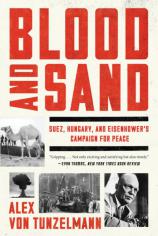Blood and Sand: Suez, Hungary, and Eisenhower's Campaign for Peace
Review
Blood and Sand: Suez, Hungary, and Eisenhower's Campaign for Peace
Do you imagine the 1950s as a peaceful time? Americans retain strong visual images of the United States during this decade, with young women wearing full skirts and bobby socks, Elvis Presley’s first hit songs, and black and white television with “I Love Lucy” and “Father Knows Best.” America was rebuilding her post-war economy as well as embarking on the Cold War attitudes and politics that would influence the nation for the next 50 years. Rather than the time of peace that many imagine, there was an enormous concoction of political intrigue, new players on the world stage, and attempted rebellions occurring in both Europe and the Middle East during this period.
Alex von Tunzelmann unfolds an incredible historical account of two tumultuous weeks in the autumn of 1956, and introduces readers to the intimate conversations and events of leaders and countries that changed the face of world politics thereafter. Britain, France, Egypt, Israel, Hungary, the USSR and the United States --- and the leaders and political parties that represented them --- all come to a breaking point and beyond in BLOOD AND SAND.
"Alex von Tunzelmann’s impeccable writing and highly readable book uncover for readers of today a period of just two weeks when empires were won and lost; wars were fought, both justly and unjustly; and decisions were made that still impact and influence world politics."
Britain and her prime minister, Anthony Eden, are reeling from the Egyptian nationalization of the Suez Canal, previously run by an English company and shareholders. In fact, Eden is not only looking to oust popular Egyptian leader Gamal Abdel Nasser; he’d like to see him taken out completely, as in “murdered.” Handsome, charismatic Nasser was beloved by Arab nations all over the Middle East and even by CIA operatives, who knew they could work with him in a positive way. Yet Eden, faced with the shrinking of the British Empire, falling popularity of his own leadership, and a failing home economy focused all his frustration and anger over these events on Nasser, as if the Egyptian leader was responsible for them all. (Many accounts speak not only to Eden’s declining health during this time but also to emotional and mental health struggles that clearly influenced the coming events.) Eden’s solution? To secretly collude with France to encourage Israel to invade Egypt while unseating Nasser, and regain some British control of the area while implying to the world that they’re really coming to the aid of Israel against her enemy. All to achieve Eden’s desire to remove Nasser and restore British influence in the area.
North and a bit east of Egypt and Israel, Hungary is experiencing its own political upheaval. A peaceful student demonstration is met by what essentially was a Soviet invasion. Unarmed or lightly armed students and Hungarian military were no match for the armaments of Soviet tanks, which blasted away in squares and killed or injured thousands of Hungarians, who simply desired a more democratic society. Western leaders, including President Eisenhower, were horrified yet hesitant to get overly involved, not wishing the USSR to believe America was moving against them in this new cold war.
What really happened in these nations during this short period of history? What decisions were made, and why? Why didn’t individual political leaders intervene in choices that were both unjustified and clearly would have a disastrous outcome? Journal entries and historical records reveal courses of action in all these nations that still impact the world today. The author unfolds these days, sometimes in hourly recounting, of the men and their conversations and decisions of invasion, collusion, deception and brutality…and what the world did, or didn’t do, in response.
Alex von Tunzelmann’s impeccable writing and highly readable book uncover for readers of today a period of just two weeks when empires were won and lost; wars were fought, both justly and unjustly; and decisions were made that still impact and influence world politics. In BLOOD AND SAND, you’ll meet political leaders and read about events you might never have known much about, but that the world is still experiencing fallout from to this day. You’ll feel as though you’re looking over the shoulders of the men who made critical (and sometimes astoundingly foolish) decisions and moves in October and November of 1956.
Reviewed by Melanie Reynolds on November 4, 2016
Blood and Sand: Suez, Hungary, and Eisenhower's Campaign for Peace
- Publication Date: October 10, 2017
- Genres: History, Nonfiction
- Paperback: 576 pages
- Publisher: Harper Paperbacks
- ISBN-10: 0062249258
- ISBN-13: 9780062249258





